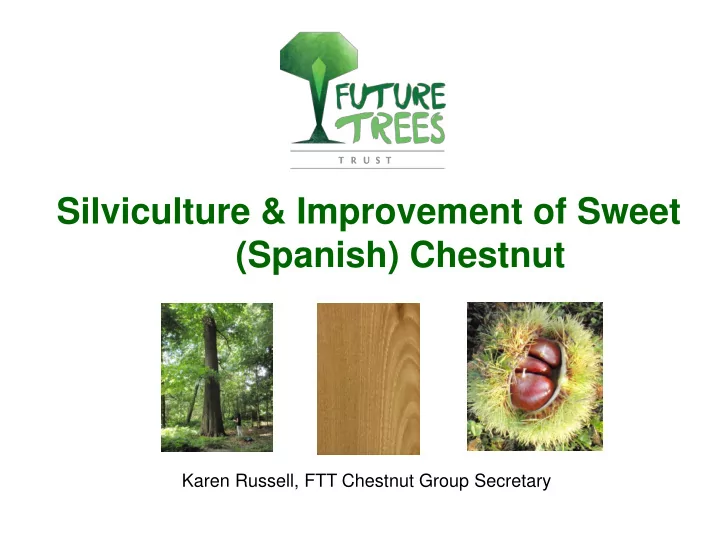

Silviculture & Improvement of Sweet (Spanish) Chestnut Karen Russell, FTT Chestnut Group Secretary
Introduction to Chestnut ( Castanea sativa ) • Non-native • Long lived, multipurpose species • Prefers sheltered & fertile sites • Relatively easy to establish • Good apical dominance & rapid growth • High forest or coppice - short rotations • Windfirm • Natural durable, versatile & valuable timber • Suited to climatic change predictions
• Fertile, free draining soils • Plant with nurse species & create understorey • Stump back poor trees • Use natural pruning • Crown thin to favour large crown • 6m or more clean stem • Target 40-45 DBH at 50 years • 150 – 200 trees/ha final crop High Forest
High quality timber uses: • Veneers • Furniture and joinery • Structural timber • Wine/port barrels
Coppice • Wider range of soil conditions • Avoid frost prone & wet sites • Density 1200-1500 stems/ha • Cut at 5-7 years initially • Grow as pure crop for maximum yield • 14 year rotation • 110 -130 tonnes/ha average • Multiple uses • High wildlife benefits
Potential Constraints • Shake • Diseases: Ink Disease (and Chestnut Blight) • Pests: Squirrels (and Oriental Gall Wasp) • Lack of culture
FTT Chestnut Group: Objectives • To identify, conserve & utilise seed stands and outstanding ‘plus’ trees • To increase the quality, quantity & use of timber and coppice • To improve industry & public awareness and support • To provide industry with high quality seed and seedlings
Progress to Date • 206 plus trees identified – 56 in Ireland • Nearly all chestnut in Ireland is within the Coillte estate
Collection & Propagation • 195 plus trees propagated – 53* Irish trees
Seed Orchards & Clonal Archives • 2 orchards: Kilmacthomas, Co. Waterford, & Torry Hill, Kent • 2 archives: Mucklagh, Co. Wicklow & Shenmore, Herefordshire
Registered ‘Selected’ Seed Stands • 3 Coillte stands in Kerry, Waterford & Wicklow, 8.6ha in total • 5 stands in southern Britain including 3 on private estates, 27.5ha in total
Finger-jointing & Glulam Technologies
Industry & Public Awareness & Support • FTT presentations, events, articles • Publications • Wider industry and public engagement • Trials and demonstration plantings* • Members’ own activities in promoting the species and its use • British Standard mark for chestnut structural timber
Acknowledgements • Ted Horgan • ABFI, Loughall • Teagasc • Coillte • University College Dublin • COFORD • Charitable Trusts • DAFM • Other FTT members & • Ellen O’Connor supporters including private • Ellen Parkinson landowners • John Leigh-Pemberton
Recommend
More recommend